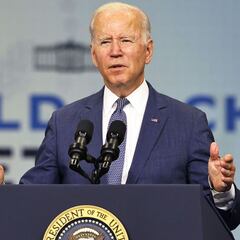How many people would be affected by the billionaire tax plan?
The US government is targeting the wealth of its billionaires as the president seeks to pay for his agenda - how many will be affected?


House of Representatives Speaker Nancy Pelosi says Democrats hope the plan to tax the super rich would raise as much as $250 billion to help pay for expanding the social safety net and tackling climate change. In total, 700 billionaires would be affected by the change.
The Council of Economic Advisers economists estimates that half of these families paid a rate of 8.2% on $1.8 trillion in income from 2010 to 2018, far below that levied on the middle-class in the US.
The average billionaire in America today has a lower tax rate than the average worker. Does that seem acceptable to you?
— Bernie Sanders (@BernieSanders) October 22, 2021
But as there is currently no obligation for billionaires to disclose their wealth to the IRS, making it difficult for the government to estimate how much can be raised by taxing the group more.
Why are billionaires being singled out?
More than $5 trillion is held by Americans worth at least $1 billion, according to the Bloomberg Billionaires Index. This group of more than 800 billionaires has more than doubled its net worth in the last five years. Democrats and many Americans feel that this amount of wealth is unethical in the context of a pandemic that has devastated millions of people's finances, while the super rich are making more money than ever.
Gabriel Zucman, a University of California at Berkeley economics professor whose research on the subject helped inspire Democratic tax proposals, agrees, saying "billionaires have lower taxes than the middle class" as a percentage of their income.
"It would be historic. It would be the most progressive tax ever," Zucman said.
What are the Democrat plans to target the super rich?
Under current rules, the super rich can entirely avoid income taxes by holding assets until they die. If they need money, it can be borrowed against their assets, a tax-avoidance strategy known as “buy, borrow, and die.”
Tax can only be levied on investments once the investment has been sold, but if the rules were to change, then investors would need to declare to the IRS where their money is invested and how much is invested. Taxes would then be levied on most investments while they are still an investment "on paper" rather than when they are sold, which can be deferred until a preferable time.
Under the new "billionaire tax" Dems are working on, the top 10 richest Americans would pay more than half of the $500 billion that Dems hope to raise.
— Heather Long (@byHeatherLong) October 26, 2021
(Billionaires would basically be taxed now on lifetime earnings)https://t.co/PqSVcwQPuy via @andrewvandam @JStein_WaPo pic.twitter.com/DIZXCkqofW
Related stories
These would be taxed only for US taxpayers with over $1 billion in assets or $100 million in income for three consecutive years, according to plans. While the Democrats have not said this tax will happen, it is said to be in a "menu of options" for how to fund the president's wide-ranging social spending plans.
Predictably, billionaires have come out against the plans. “Eventually, they run out of other people’s money and then they come for you,” Elon Musk, the world’s richest person, tweeted Monday evening. Musk’s fortune has grown by $119 billion since the start of the year.
